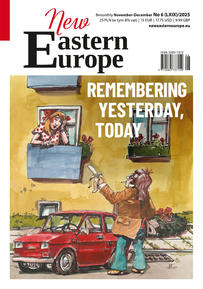Anyone interested in Central and Eastern Europe understands that this region is far from monolithic, also in the implementation (or lack thereof) of western economic and political systems. At the same time we cannot deny there is something idiosyncratic about the former Soviet bloc, something which links its societies together. Either through common experience or history (or both).
We address this phenomenon in this issue roughly using the term Homo post-sovieticus. It allows our authors to talk about the legacy of the socialist past that, as they argue, has not yet fully disappeared. Its traces can be found throughout the region and shape the lives of its many people. These traces have been captured by a group of photographers who collectively call themselves the Sputnik group. Their unique project is presented by Wojciech Górecki in the opening essay to this issue and is accompanied by some their illustrative photographs.
In addition, we tackle the issue of the incomplete system transformation which, in many cases, has allowed for a creation of hybrid socio-economic systems. They may, like in Georgia as discussed by Kaja Puto,be a result of a hasty reconstruction of the state to look more like what is believed to be the West. Or, as is the case of Belarus, which is analysed by Maxim Rust, reveal a slower emergence of collective identity that is both submissive and open, passive and entrepreneurial. A simultaneous challenge and opportunity.
In the case of post-Maidan Ukraine, which without a doubt the transformation has gone much further, the rooting of the western value system is also still under way. As we can see from Andriy Lyubka and Nina Boichenko’s texts the possible risks of its interruption cannot be ignored.
Additionally, in this issue we have prepared two special sections: the first one, published on the 500-year anniversary of Martin Luther’s Ninety-five Theses debates the legacy of the Reformation from our region’s standpoint, while the second, at the end of the issue, is dedicated to Joseph Conrad – a Polish-born writer whose masterpieces have been read and studied throughout the world for generations. Our authors take a new look at Conrad, his influences and how his works are still very relevant in 2017.
New Eastern Europe is a new bi-monthly magazine dedicated to Central and Eastern European affairs. The magazine is the sister edition of the Polish version Nowa Europa Wschodnia, which has been on the Polish market since 2008. Countries in particular focus in New Eastern Europe include Russia, Ukraine, Belarus, Moldova, as well the Caucasus region - Georgia, Armenia, Azerbaijan, Chechnya, etc.
Articles in New Eastern Europe focus on a wide range of social, political and cultural issues facing this region. The journal includes original opinion and analytical texts; historical accounts; reports from correspondents in the countries with full colour photos; and reviews of books, music and film about and emerging from Eastern Europe.
























